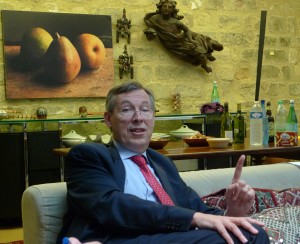Iran’s growing nuclear ambitions, the Israeli-Turkish incident, South Korea’s response to the sinking of its ship in the Yellow Sea and Obama’s posture on nuclear non-proliferation were just a few of the topics covered when one of France’s pre-eminent foreign-policy thinkers met with AAPA members at the home of member John Morris on June 9.
Heisbourg, who was a guest of the Association on three previous occasions, described Iran’s current capability as a “reasonably developed industrial basis for weapons”, but said the Iranians were incapable of making significant “step changes” upward to the next level.
He observed that several regional countries would follow Iran’s lead if it went nuclear; but Tehran might also mimic Israel’s stance of never officially admitting its nuclear capabilities.
According to Heisbourg, the Eastern-Med Israeli-Turkish incident has critically harmed relations between the two countries, which Israel needed more than Turkey. The relationship is “beyond retrieval,” he felt, adding that the Marmara boarding “casts doubt on the Israeli leadership’s ability to think clearly.” And Turkey had been “Israel’s biggest foreign-policy catch in 20 years.”
Meanwhile, the new Turkish foreign minister has managed to repair relations with virtually all its neighbors in just six months as part of a deliberate let’s-get-along policy that Ahmet Davutoglu has been implementing. Heisbourg also hailed Turkey’s 2001 decision, taken in the midst of a monetary crisis, to become “a big economic player,” calling it a success.
In good neighborliness, Russia may be taking a leaf from Turkey’s book, he said, pointing to resolution of the long-standing issue with Norway about the Barents Sea. With Poland, Moscow had carefully remained quiet about the black boxes following the crash that had decapitated Warsaw’s cabinet.
Heisbourg replied stoically when asked his view on the situation in Afghanistan: “Mountainous,” he observed. He now tends to accept the assessment of U.S. Gen. Stanley McChrystal in terms of troop deployments and the withdrawal timetable.
On the issue of nuclear non-proliferation, he stated, “I accept the dream” of the NPT and its Article 6, saying that “ultimately we have to go to a nuclear-free world.” The U.S.’s “reset” with Russia was “good news”, he felt, noting that with 90% of nuclear weapons in the arsenals of the two powers, it was up to them to begin significant draw-downs.
Heisbourg praised the way South Korea had handled the sinking of one of its naval vessels, taking the high road of an independent inquiry similar to what UN Secretary General Ban Ki-moon had recommended for the Gaza relief-boat incident.
 In other observations, he scoffed at the U.S.’s intelligence capabilities, pointing out that it was spending $30 billion a year on the effort: “I have very little patience for American intelligence assessments,” he said. His concluding remark was cautionary indeed: “A multi-polar Middle East is,” he said, “a recipe for use of nuclear weapons.”
In other observations, he scoffed at the U.S.’s intelligence capabilities, pointing out that it was spending $30 billion a year on the effort: “I have very little patience for American intelligence assessments,” he said. His concluding remark was cautionary indeed: “A multi-polar Middle East is,” he said, “a recipe for use of nuclear weapons.”
-By John Davidson